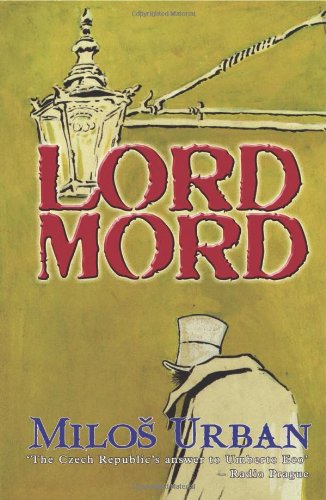Another Gothic novel of Prague...
Miloš Urban's Lord Mord
A book review
"Lord Mord" opens with an edited
extract from "Bestia Triumphans", an inflammatory pamphlet published
in 1896 by Czech writer Vilém Mrštík in which he denounces the
"clearance" and rebuilding of the Prague Jewish quarter, known as
Josefov. The fictional plot of the novel unfolds against this historical
backdrop. Its narrator is Count Arco, a thirty-year-old member of the minor
Czech nobility who wastes his time and money on whores, alcohol and drugs and
who knows the Jewry well thanks to his dubious nightly haunts.
It is difficult to warm to Arco - he is indolent and arrogant and his attitude to women is particularly demeaning. Indeed, this threatens to mar one's enjoyment of the novel, which lacks a strong female character to balance the misogyny of the protagonist. Arco, however, turns into an unlikely hero when he purchases an ancient house and stands up to the authorities when they include it in their demolition plans. In the fraught political atmosphere of the turn of the century, this borders on an act of treason against the Imperial authorities. As if this were not enough, Arco's path crosses that of "Kleinfleisch", a mythological bogeyman who starts to haunt the Jewish quarter, killing prostitutes close to Arco.
 |
| Old Postcard of Prague, Jewish Quarter |
"Lord Mord" shares several elements with Miloš Urban's earlier and better known novel The Seven Churches - not least the Prague setting, the concept of the individual resisting "modern" developments and the serial killer subplot. This is, therefore, another "Gothic novel of Prague". However, whereas Seven Churches was based in 1990s Prague with mysterious flashbacks/visions of the Middle Ages, "Lord Mord" is squarely set a century before. I don't know about the original Czech version, but the flowing translation by Gerald Turner does not attempt to mimic the flowery language of the period. Rather than through a pastiche of earlier style, the novels of the 19th century are referenced through elements of plot and setting, which replicate common tropes of classic urban Gothic and adventure novels - narrow, foggy streets; drug-fuelled visions; consumptive prostitutes; serial killers sowing terror in the cover of the night; and also some final derring-do worthy of Dumas.
On the whole, I felt that whilst less original and striking than Seven Churches, "Lord Mord" is better crafted and more satisfactory from a purely narrative point of view. No cult novel then, but certainly an assured and entertaining one.
Published March 1st 2013 by Peter Owen Publishers (first published 2008)
 |
| Narrow streets of Josefov, demolished between 1893 and 1913 |








No comments:
Post a Comment